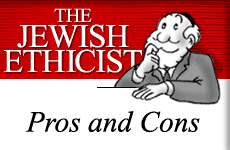 Vampire Weekend's Surprising Jewish Stories
Vampire Weekend's Surprising Jewish Stories


4 min read
3 min read
4 min read
5 min read
Do professionals need to strive for complete objectivity?
Q. You recently stated that selling and providing advice should be strictly separated. How does this apply to professionals?
A.In a recent column, I explained that a salesperson doesn't have to be objective. On the contrary, his or her job is to be an honest but partial advocate for the benefits of the product being sold. The consumer in turn is the judge, who makes an informed judgment after hearing the arguments from all sides, that is, all the businesses competing for the purchaser's spending.
Conversely, an advisor must be completely objective. His or her job is to advance the interests of the client, not to manipulate them. For this reason I condemned "in-house" financial advisors whose real job is not to advise the client but rather to sell to him.
One reader pointed out that this advice is not easily applied to professionals. The nature of the professions is that the expert provides both advice and service. A dentist diagnoses a cavity and also fills the tooth; an auto mechanic diagnoses the source of problems and repairs it, and so on.
While it is true that a professional both advises and sells, I think that his or her primary responsibility is providing impartial advice. During the advice stage, the professional is required to give counsel based solely on the best interest of the client. The average person is simply not in a position to play judge on whether or not he has a cavity, or a faulty carburetor, etc. Thus, he is totally reliant on the judgment of the professional.
Just as the average person is unable to judge whether or not he needs an operation, he is unable to evaluate the expertise of the professional he consults. This is one reason that professions almost always have professional societies which impose standards of conduct and of expertise among members. Jewish law encourages the formation of societies of this nature, and gives members of a trade the power to make binding restrictions on who is qualified to practice their trade and to regulate practice. In order to prevent these regulations from being anti-competitive, they are subject to the oversight of a local authority. (1) Membership in such a society or guild gives the client confidence that the professional is truly qualified to dispense impartial advice and is subject to some disciplinary process which can penalize him for acting in an unprofessional way.
Another way in which Jewish law gives special recognition of the expertise of trained professionals is giving them a partial exemption for advice which turns out to be ill-advised. An untrained individual is liable for giving bad advice, but Jewish law considers that a person with recognized professional credentials has the ability to exercise professional judgment, and that his or her "mistakes" are probably merely a regrettable case where problems could not have been foreseen. (2)
In many cases, sticking to giving impartial advice will keep a professional from any kind of conflict of interest. The client is provided with all the information needed to make an informed decision, based on the expert judgment of the professional. There is no scope left for advocacy. We would not expect a heart surgeon to explain to a patient that he has a choice between bypass surgery and a stent, and then add that there is a special sale on stents for one week only.
But we must admit that sometimes professional practices do include many discretionary items which the professional may want to market. For example, dentists routinely carry out purely cosmetic procedures such as whitening. This is acceptable as long as the professional clearly explains to the patient where the line is drawn. It's best if any "marketing" aspect of the interaction is left to a completely different part of the visit. For example, a dentist will first examine a patient and explain any dental work called for based on accepted professional standards. After the consultation is completed, the dentist can say, "By the way, you may also be interested in cosmetic dentistry treatments my practice can offer." A garage mechanic can finish explaining any necessary repairs, and add "By the way, we have a sale on tires." It should be made clear to the client that at this stage the professional/consultation stage is over, and that the professional is now putting on a new hat, that of salesperson.
The underlying principle, that it is forbidden to mix advice and salesmanship, applies equally to a salesperson, a consultant, and a professional. A salesperson and a consultant can easily avoid the problem by limiting their repertoire to one of these roles. Professionals inherently have a conflict of interest, because they advise their clients on services that they provide. But the presence of a conflict of interest doesn't mean that the professional will give self-serving advice. Adequate training, a commitment to impartiality and a clear distinction between advice and selling will enable a professional to fulfill all aspects of his job with ethical excellence.
SOURCES: (1) Shulchan Arukh Choshen Mishpat 331:28 (2) Shulchan Arukh Choshen Mishpat 306
The Jewish Ethicist presents some general principles of Jewish law. For specific questions and direct application, please consult a qualified Rabbi.
